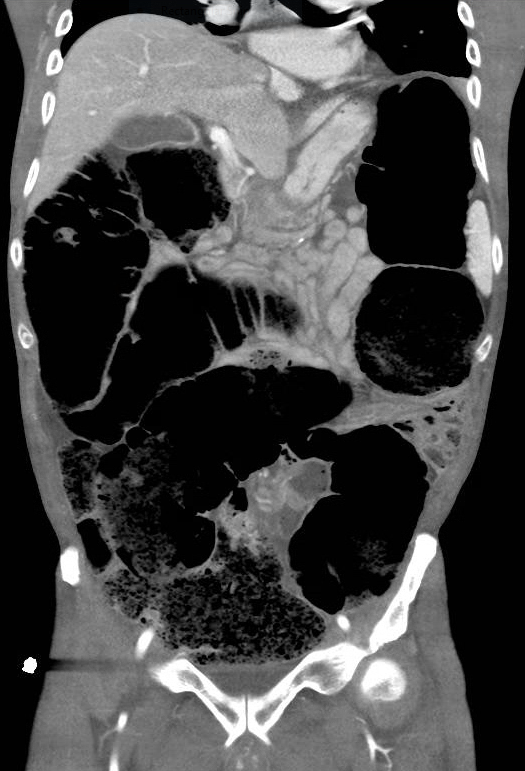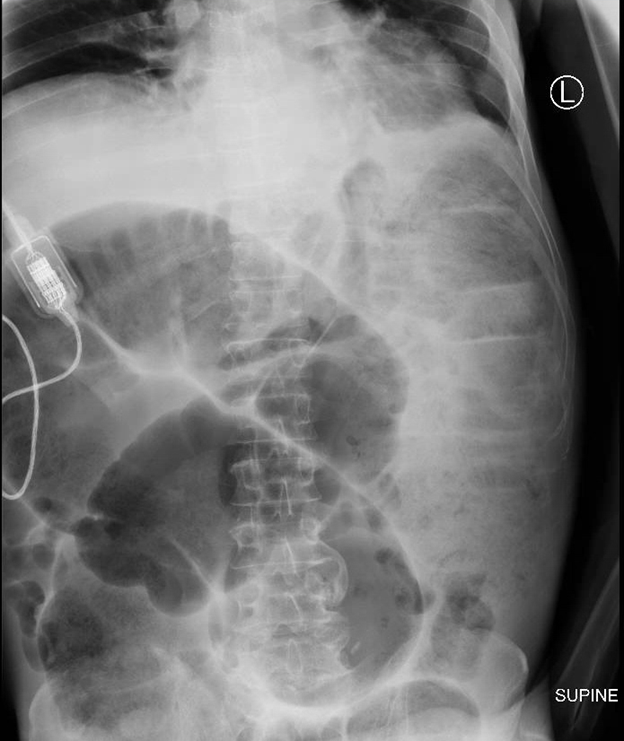Sunday Poster Session
Category: Colon
P0460 - Clozapine-Induced Sigmoid Volvulus: A Rare but Serious Gastrointestinal Complication
Sunday, October 26, 2025
3:30 PM - 7:00 PM PDT
Location: Exhibit Hall

Sameh Gomaa, MD
Phoenixville Hospital - Tower Health
Phoenixville, PA
Presenting Author(s)
Sameh Gomaa, MD1, Hatem Ahmed, MD1, Rouaa Chikho, MD2, Imad Alabdul Razzak, MD1
1Phoenixville Hospital - Tower Health, Phoenixville, PA; 2Tower Health, Phoenixville, PA
Introduction: Clozapine frequently causes severe colonic hypomotility, yet frank bowel obstruction remains under-recognized. Sigmoid volvulus is the most common colonic volvulus. It affects elderly men with chronic constipation or neuro-psychiatric illness, but has not previously been linked to clozapine despite links to cecal volvulus.
Case Description/
Methods: A 69-year-old man with schizophrenia 27 years on clozapine 300 mg/day/ valproate and CKD, presented with three weeks of progressive abdominal pain, distension and liquid stools. Vitals were stable except for SpO₂ of 88 % on room air. The abdomen was markedly tympanitic and tender. Laboratory tests showed leukocytosis (11 × 10⁹/L), hyponatremia (126 mEq/L), and mild transaminitis (AST/ALT 91/85 U/L). CT abdomen/pelvis revealed a twisted sigmoid mesentery with marked upstream dilatation and high-grade sigmoid volvulus. Initial endoscopic detorsion with rectal tube achieved decompression, but rapid recurrence mandated repeat endoscopy and elective laparoscopic sigmoid colectomy during the same admission. Pathology was benign; the patient recovered uneventfully after clozapine was discontinued and switched to olanzapine.
Discussion: Clozapine’s anti-muscarinic, anti-serotonergic and anti-adrenergic actions markedly slow gut transit, predisposing to severe constipation, pseudo-obstruction and, rarely, volvulus. Although a few clozapine-related cecal volvulus cases exist, this appears to be the first documented instance involving the sigmoid colon. Management follows general principles—prompt imaging, endoscopic detorsion when viable, and early definitive resection because recurrence after detorsion approaches 50–75 %. Recognition of the offending drug is essential; concomitant anticholinergic agents (e.g., valproate, tricyclics, opioids) amplify risk. Sigmoid volvulus can complicate chronic clozapine therapy. Clinicians should maintain a high index of suspicion for bowel obstruction in constipated clozapine-treated patients, expedite imaging, and coordinate early gastroenterology, surgical, and psychiatric input. Proactive bowel regimens, patient education, and judicious medication review are key to preventing this potentially fatal but preventable complication.

Figure: Contrast-enhanced CT scan of the abdomen and pelvis demonstrating twisting of the sigmoid mesentery and significant colonic distension.

Figure: Repeat abdominal X-ray showing extensive bowel distention with a colonic loop measuring approximately 13.7 cm and significant stool burden throughout the descending colon.
Disclosures:
Sameh Gomaa indicated no relevant financial relationships.
Hatem Ahmed indicated no relevant financial relationships.
Rouaa Chikho indicated no relevant financial relationships.
Imad Alabdul Razzak indicated no relevant financial relationships.
Sameh Gomaa, MD1, Hatem Ahmed, MD1, Rouaa Chikho, MD2, Imad Alabdul Razzak, MD1. P0460 - Clozapine-Induced Sigmoid Volvulus: A Rare but Serious Gastrointestinal Complication, ACG 2025 Annual Scientific Meeting Abstracts. Phoenix, AZ: American College of Gastroenterology.
1Phoenixville Hospital - Tower Health, Phoenixville, PA; 2Tower Health, Phoenixville, PA
Introduction: Clozapine frequently causes severe colonic hypomotility, yet frank bowel obstruction remains under-recognized. Sigmoid volvulus is the most common colonic volvulus. It affects elderly men with chronic constipation or neuro-psychiatric illness, but has not previously been linked to clozapine despite links to cecal volvulus.
Case Description/
Methods: A 69-year-old man with schizophrenia 27 years on clozapine 300 mg/day/ valproate and CKD, presented with three weeks of progressive abdominal pain, distension and liquid stools. Vitals were stable except for SpO₂ of 88 % on room air. The abdomen was markedly tympanitic and tender. Laboratory tests showed leukocytosis (11 × 10⁹/L), hyponatremia (126 mEq/L), and mild transaminitis (AST/ALT 91/85 U/L). CT abdomen/pelvis revealed a twisted sigmoid mesentery with marked upstream dilatation and high-grade sigmoid volvulus. Initial endoscopic detorsion with rectal tube achieved decompression, but rapid recurrence mandated repeat endoscopy and elective laparoscopic sigmoid colectomy during the same admission. Pathology was benign; the patient recovered uneventfully after clozapine was discontinued and switched to olanzapine.
Discussion: Clozapine’s anti-muscarinic, anti-serotonergic and anti-adrenergic actions markedly slow gut transit, predisposing to severe constipation, pseudo-obstruction and, rarely, volvulus. Although a few clozapine-related cecal volvulus cases exist, this appears to be the first documented instance involving the sigmoid colon. Management follows general principles—prompt imaging, endoscopic detorsion when viable, and early definitive resection because recurrence after detorsion approaches 50–75 %. Recognition of the offending drug is essential; concomitant anticholinergic agents (e.g., valproate, tricyclics, opioids) amplify risk. Sigmoid volvulus can complicate chronic clozapine therapy. Clinicians should maintain a high index of suspicion for bowel obstruction in constipated clozapine-treated patients, expedite imaging, and coordinate early gastroenterology, surgical, and psychiatric input. Proactive bowel regimens, patient education, and judicious medication review are key to preventing this potentially fatal but preventable complication.

Figure: Contrast-enhanced CT scan of the abdomen and pelvis demonstrating twisting of the sigmoid mesentery and significant colonic distension.

Figure: Repeat abdominal X-ray showing extensive bowel distention with a colonic loop measuring approximately 13.7 cm and significant stool burden throughout the descending colon.
Disclosures:
Sameh Gomaa indicated no relevant financial relationships.
Hatem Ahmed indicated no relevant financial relationships.
Rouaa Chikho indicated no relevant financial relationships.
Imad Alabdul Razzak indicated no relevant financial relationships.
Sameh Gomaa, MD1, Hatem Ahmed, MD1, Rouaa Chikho, MD2, Imad Alabdul Razzak, MD1. P0460 - Clozapine-Induced Sigmoid Volvulus: A Rare but Serious Gastrointestinal Complication, ACG 2025 Annual Scientific Meeting Abstracts. Phoenix, AZ: American College of Gastroenterology.

